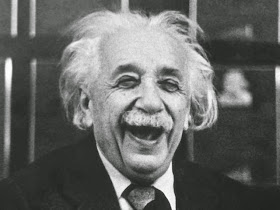It's time for management to focus on focus.
I’ve often wondered what would happen if a power outage or
Internet outage were to suddenly free a generation from distractions for a few
months, wondered what sort of creative output might ensue as people were better
able to focus, even if only out of boredom.
And more realistically, I’ve wondered what would happen if
we simply got more serious about creating the conditions that heighten focus, conditions that better helped us to tune out the static of the modern world that masquerades as signal.
In 1666, Newton gave a rather spectacular demonstration of
what is possible when a young man fully immersed in new ideas is suddenly free
from distractions and left to create. In 1905, Einstein demonstrated what
is possible in spite of distractions.
In 1666, a plague closed Cambridge University and Isaac
Newton took refuge in his mother’s house in Woolsthorpe, a place so boring that
young men apparently watched apple trees for entertainment. That year he
developed calculus, an analysis of the light spectrum, and the laws of gravity.
I don’t know how you’d even begin to measure his productivity in that year.
(And of course if you focused on just that year you would miss the benefits
that have continued to accrue in the centuries since.)
Einstein already had a family when he had his most amazing
year. A student of his visited his house later and observed as Einstein bounced
his youngest son – then a baby – in one hand while he scribbled equations with
his other hand, meanwhile assuring his imploring toddler son that he was almost
done. He was notoriously absent-minded
but that was probably just a by-product of his preoccupation with explaining
all of space and time.
In 1905, in five separate papers, Einstein devised a
revolutionary quantum theory of light, helped prove the existence of atoms,
explained Brownian motion, upended the concept of space and time, and produced
what would become science’s best known equation, e = mc2.
Einstein was so exhausted when he finished in June that his
body buckled and he went to bed for two weeks.
Then he and his wife did something unusual: they celebrated
together. After he finished the first four of the five papers that would revolutionize
physics, he sent an old friend a postcard signed by his wife as well. It read
in full: “Both of us, alas, dead drunk under the table.”
It’s hard to imagine any normal 8 to 5 work rhythm allowing
that sort of intense, obsessive focus or indulge the resultant exhaustion. Or to
imagine to how many decimals one would have to go to compare the productivity
of any 8 to 5 work with these amazing feats.
I realize that Newton and Einstein were geniuses. In that
sense it is not fair to compare us normal folks to them. But I’m also convinced
that the degree of focus a culture or environment encourages can change
apparent IQs by 10s of points. People who are forced to frantically multitask
aren’t able to think through implications, consider alternate possibilities,
and can’t fully attend to the facts, much less their consequences. In short, all
the evidence you would collect would suggest that they are dumber than they really are. By contrast,
someone who isn’t just able to focus on a task but to ponder it later will see
not just the facts but how they connect to other facts and better understand
how changes will ripple out to impact other realities. Simply put, they will be smarter, giving every evidence of having a higher IQ. Not because they are innately smarter but because you and they collaborated to create the conditions that enabled them to focus, to think rather than react.
It is doubtful that you've hired the next Newton or Einstein. But I
guarantee you that depending on the working conditions you create, you can move
your employees closer or further from such genius. You can create a work
environment that encourages focus or fractures it. Unless you’re asking them to
do something terribly mindless – in which case you have another set of problems
– this may be the most important thing your company ever creates.
These accounts of Einstein come from Walter Isaacson's biography of Einstein.


If you've got three minutes, you might like this: http://youtu.be/Edx9D2yaOGs
ReplyDelete(It sort of goes with the first part of your post, if you take the Big Broad Flexible Outlook.)